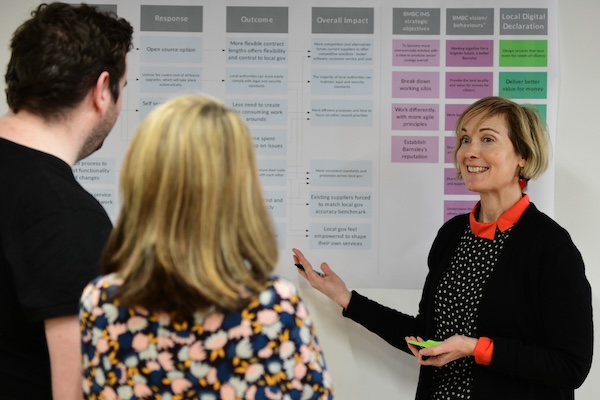Government must invest in people over technology to improve services

People building services might be working in new ways, but the people buying services and developing policy aren’t
dxw has been around for 15 years, building public services with teams across government. In that time, the maturity of technology and delivery teams has come a long way. 5% of civil servants in central government now work on Digital and Data projects.
As former civil servants, we can see the difference that makes to services. On the ground, we work with passionate, talented public servants. But the skills and understanding needed to work on digital services are spread thin. There might be more people with these skills, but the demand for digital transformation has skyrocketed.
And while people building services might be working in new ways, the people buying services and developing policy aren’t. That’s a big barrier to better. There are ways to improve that, but it’ll take meaningful investment to do it.
Expertise needs stability
As Dave (our CEO) said last year, teams need to be on the hook for outcomes. Stable product and service ownership is a valuable part of that. Those owners can take the long view, and use data to make smart decisions about what to prioritise. Technical ownership is important too. Strong foundations gives teams the flexibility to adapt.
But even on big transformation programmes, we’ve seen higher than normal turnover. On one project, we saw more than 50% of the civil servants change through the course of a 2-year contract. That’s hugely disruptive. It means teams spend a long time getting new people up to speed. It can also see people totally unfamiliar with products suddenly assuming responsibility for a multi-million pound programme mid-flight. Decision making becomes focused on the short-term. The easiest choice usually wins out over the best choice.
That churn compounds another problem: teams aren’t staffed to the appropriate level. Hybrid, multidisciplinary teams don’t need to have one specialist per project. Researchers who work on several related services can still bring value to teams. But rather than working on a handful of related challenges, these specialists may be working on a dozen – each totally unrelated.
Specialists in this position need to be able to rely on a strong owner. Someone who can take what they’ve learned and apply it to the problem the team is tackling. Without that, so much of what they find out can’t go anywhere.
Delivery begins before building
Without strong direction on the ground, commissioning becomes harder than it needs to be too. The vast majority of procurement staff are trained to buy products, not commission services. That’s not just a civil service problem: it’s a widespread challenge. But that gap in understanding can be overcome when delivery teams are empowered to go to bat for what they need.
In our experience, this translation layer can be absolutely essential. At the Ministry of Justice, we had a senior service manager who worked hard to ensure there was an open collaboration between policy people and the delivery team, ensuring continuous alignment of the outcomes.
This kind of ownership helps in procurement too. It leads to contracts focused on outcomes, rather than deliverables or processes. We get to have frank conversations throughout the bidding process. These help every bidder understand the scope and scale of the challenge they’re tackling.
Without that, well, Alex (our Director of client Services) has already written about the challenges we face when it comes to procurement.
Learning by doing
The civil service has a strong history of internal training. Some programmes already have a ‘digital’ module. But they need scaling up to meet the current challenge.
The Fast Stream is a great place to start. Developing digital literacy from the ground up is great preparation for any challenge. Embedding Fast Streamers from ALL disciplines across the Civil Service spectrum with delivery teams shows them how critical technology delivery is. This would be especially valuable if they served with a single programme for a minimum of 6 months. Long enough to understand what its users need and what the policy implications are.
No person can ever interact with every government service. Building up deep experience of one service helps people learn how to make compassionate, long-term decisions. That’s true regardless of whether graduates later specialise in policy or delivery.
For staff who have been in place for a while, the Academy model is long-established. Building literacy in service design, user research and technology choices would make attendees allies for transformation. Extending this to teams who have, historically, not had access to this curriculum is crucial. Policy and procurement teams could enjoy deeper understanding of iterative, outcomes-focused working.
Senior Leadership needs this training too (although that’s a blog post for another day). Developing Centres of Excellence would be a signal that government takes this seriously at all levels.
The goal of all these would be to help teams work and buy smarter. We could see a civil service empowered to make truly transformative decisions: What services could we automate away? What digital infrastructure do we need to invest in? What will help us deliver the outcomes we need?
At the very least it will mean teams are better informed when they go to market and engage suppliers of all sizes. That’s what will lead to better outcomes, for better value.
Huge potential for better value
We’re lucky. We work with a lot of partners in government who have the skills to deliver great services. They understand the potential of what technology can do. But, to a certain extent, that’s self-selecting: when we find great teams we make an effort to keep working with them.
We see so much potential for public service reform. Giving public servants training to see what new approaches could unlock for them would be a gift. Better services for better value. The civil service knows how to do this; it needs to invest in doing the right thing.